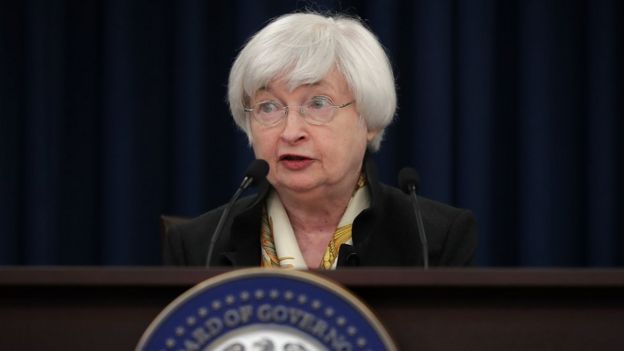
Fed points to US interest rate rise by end of year
Minutes from the Federal Reserve's September meeting show the majority of policy-makers expect a rise in US interest rates by the end of the year.
At its meeting, the Fed opted to hold rates between 0.25% and 0.5%.
But three officials opposed the decision - the most dissents since December 2014.
The Fed said: "The case for an increase in the federal funds rate has strengthened," but said it would wait for more evidence of economic progress.
Doug Duncan, chief economist for Fannie Mae, said: "There's a pretty big dissent. There seems to be a pretty big discussion about the direction on rates.
"It's clear they want to raise rates in December if things don't deteriorate."
Risks 'roughly balanced'
The Fed said US economic activity had picked up and job gains were "solid" in recent months.
The US central bank said it saw near-term risks to the economy as "roughly balanced." It was the first time it has used that wording since late last year, when it most recently raised rates.
The Federal Open Market Committee had decided against raising rates "for the time being," until there was more evidence of progress towards its employment and inflation objectives.
The committee said it expects inflation to remain low in the near term, "in part because of earlier declines in energy prices", but that it would rise to the Fed's 2% target over the medium term.
Policymakers have been divided when the next rate rise should be, with stock market volatility, China's slowing economy, and Brexit among its concerns.
Analysis: Andrew Walker, BBC economics correspondent
The wait continues. Still, there were signs that the committee is closer to being ready for its next rise in interest rates.
For one thing, Janet Yellen said the case for an immediate increase was stronger than it was, though not strong enough for her to be ready just yet.
The number of dissenting members who did vote for an immediate move has increased. This time there were three. In July it was just one.
All that is evidence that the committee thinks the economy is continuing its gradual return to normal.
But we also discovered that the Fed's thinking about what "normal" is has weakened further.
Their view of the economy's long term growth prospects has edged down from 2% to 1.8%.
The level they think interest rates will settle at has also dropped slightly. In other words, growth and rates will fall even further below where they were before the financial crisis.
"Normal" is not what it used to be.

Federal Reserve chair Janet Yellen said: "We judged that the case for an increase has strengthened but decided for the time being to wait for further evidence of continued progress toward our objectives."
She said the decision to keep rates on hold "does not reflect a lack of confidence in the economy."
"Conditions in the labour market are strengthening and we expect that to continue," she said.
Luke Bartholomew, an investment manager for Aberdeen Asset Management, said: "It was pretty much a done deal that we weren't going to get a rate hike today."
He said the meeting had been about "setting the stage" for a hike in December.
But he added: "A December hike is by no means inevitable though. We've been in the situation before where the Fed has aligned their guns only to baulk at the last minute."




